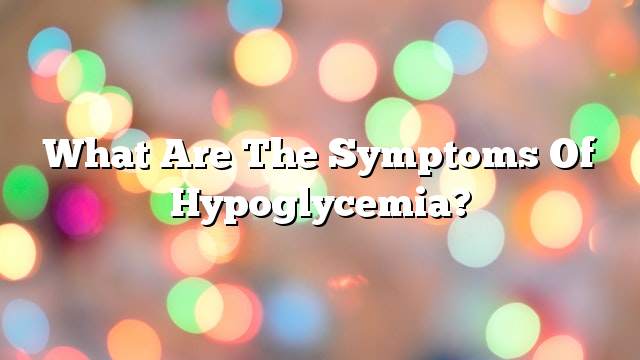Hypoglycemia
Hypoglycemia is the presence of low levels of sugar in the blood, sugar is the main source of energy in the body, and the reasons for the decline in sugar, including what is linked to drugs used in the treatment of diabetes, including what is not linked Diabetes. Hypoglycaemia occurs due to the imbalance between Glucagon and Insulin. Insulin is the hormone that helps the body take advantage of glucose or sugar in food to supply the body with energy or to store glucose until it is needed. Sugar levels are within normal limits. Glucagon is an opposite hormone in its insulin function. It is produced as a reaction when sugar falls in the body and in cases where the body needs more sugar, such as vigorous exercise.
When sugar drops to about 80 mg / dL in the blood, the level of insulin decreases to the point of preventing hypoglycemia, but when the sugar level is lower, glucagon, the body’s first line of defense against hypoglycemia, Epinephrine, the second hormone that fights hypoglycemia, cortisol and catecholamines play a role.
Symptoms of hypoglycemia
When the blood sugar level is below 50 mg / dL, symptoms of hypoglycemia begin to appear, and the brain is initially affected by this because the brain relies primarily on sugar for energy, except in the case of fasting in which the brain uses the ketones Ketone bodies as a source of energy. Unlike the rest of the body, the brain does not benefit from free fatty acids as an energy source. Symptoms that can appear on the patient when blood sugar falls include:
When the person’s condition worsens, and the blood sugar level drops more and more, the patient may also have the following symptoms:
- cramps.
- The confusion and change in the patient’s behavior, as if the person can not finish his routine tasks.
- Visual disturbances, such as bouts of vision.
- Unconsciousness.
- When the blood sugar level drops significantly, a person can behave like a drunkard.
Causes of hypoglycaemia
There are several reasons that lead to hypoglycemia, including:
- Decreased sugar due to taking large amounts of insulin.
- Some critical diseases, such as acute hepatitis, kidney disorders, and long-term hunger, can occur in the eating disorder called anorexia nervosa.
- Disorders in carbohydrate metabolism in the body, usually diagnosed at a young age.
- Adrenal insufficiency.
- Drink alcohol in large quantities. Drinking alcohol without eating can prevent the liver from releasing stored glucose into the blood stream, leading to hypoglycemia.
- Insulinoma.
Diagnosis and tests of hypoglycemia
Blood sugar is diagnosed by three criteria, often referred to as the Whipple’s triad, and includes the following criteria or factors:
- Signs and symptoms of hypoglycemia: These symptoms and signs may not occur when you visit a doctor, so the doctor may ask the patient to fast all night long or longer, so that symptoms of hypoglycemia begin to appear so that the doctor can diagnose the patient. It is also possible that the patient needs to fast within the hospital for longer, and if the sugar level after eating the meal, you should check the level of sugar after eating a meal.
- Closer blood glucose levels when signs and symptoms are detected by drawing a blood sample for laboratory testing.
- Signs and symptoms disappear when high blood sugar level.
In addition to these criteria, the doctor can examine the patient clinically, and review the history of disease.
Treatment of hypoglycemia
The patient is treated when his blood sugar level is first reduced to raise the level of sugar, and then the cause of the drop in sugar in the blood of the patient to prevent recurrence of the situation, as for immediate treatment, depends on the symptoms that appear on the patient; initial symptoms are treated for Eat 15 grams to 20 grams of fast-acting carbohydrates that quickly turn into sugar in the body, such as fruit juices or candies, and regular soft drinks, ie sugar, sugar or sugar jelly. Or fat because it is possible to slow down absorption The body of sugar. After 15 minutes, blood glucose levels should be re-examined. If blood sugar levels remain below 70 mg / dL, the patient is given another 15 to 20 g of fast-acting carbohydrates, after which blood sugar is repeated after 15 minutes. This process is repeated until the blood glucose level is higher than 70 mg / dL.
When the blood sugar level becomes normal, it is important to eat a main or light meal to stabilize the blood sugar level and replenish the glucagon stock that may have been depleted during the sugar drop. If the symptoms are severe, and this leads to the inability of the patient to eat carbohydrates through the mouth, may need to provide the patient with glucose intravenously or injected with glucagon, the unconscious person should not be given food through his mouth because it can be inhaled and reaches the lungs. People with severe hypoglycemia should acquire the Glucagon kit, and the patient’s relatives and friends should be taught how to administer the glucagon injection when an emergency sugar attack occurs.
To prevent recurrence of diabetes, you must know the underlying cause behind the landing by the doctor and treat the cause, if the reason is the drugs are discussed with the doctor to regulate the dose of insulin or medication that causes the decline of sugar, but if the cause is a tumor in the pancreas, for example , The tumor is surgically removed, and in some cases the doctor may have to remove part of the pancreas.
